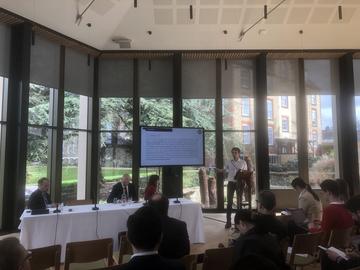The GloCoBank project held its first international conference, 'The Evolution of the Global Payments System', on 23-24 March at St Hilda's College, Oxford, with conference sessions also streamed live online. The conference programme covered a wide range of topics, including correspondent banking relationships, bank internationalisation strategies, payment infrastructures and banking technologies, and legal and regulatory frameworks, with historical cases from Europe, the US, Latin America, and Asia. The event was attended by over 60 speakers and participants from academia, central banks and the commercial banking sector and generated much discussion and sharing of ideas and expertise.

Following a welcoming address by GloCoBank Principal Investigator Catherine Schenk, the first session opened with a paper by Marianne Astore, Paris School of Economics and Paolo Di Martino, University of Turin who talked about the case of Banca d'Italia and its international expansion and use of correspondents between 1870 and 1913. This was followed by Marco Molteni, GloCoBank project, Oxford, whose paper focused on Banca Commerciale Italiana in the 20th century and archival evidence demonstrating the importance of reciprocity in correspondent banking relationships.
In Panel 2 we heard from Clement Berthou, Université Grenoble Alpes (co-author Jean-François Ponsot), who presented an infrastructural comparative study of the Eurodollar and the international Yuan cases. The second paper in this session was by Matthias Kemmerer, Goethe University Frankfurt, whose gave a paper on the Bundesbank and West German bank internationalisation after Bretton Woods (1968-1985).
The third panel included papers by Bianca Orsi et al, University of Leeds on central bank digital currencies and the international payment system and the demise of the US dollar; Pilar Nogues-Marco et al, University of Geneva, on cryptocurrencies versus bills of exchange, and Aaron M. Honsowetz, Bethany College on the provision of money orders in the US by express and telegraph companies.
Day 1 culminated with a keynote lecture by Kris Mitchener of Santa Clara University who presented his latest research (with Angela Vossmeyer, Claremont McKenna College), on how risk is redistributed during financial crises. Focusing on how the US banking system absorbed balance sheet and systemic risks during the Great Depression, Professor Mitchener argues that bank mergers constituted a key mechanism of risk redistribution. The insight was particularly timely given the concurrent news stories about the forced sale of Credit Suisse to its rival, Swiss banking giant UBS.
Our second day commenced with a paper from Lukas Dovern, University of Kiel, on international banking in the socialist world (1956-1970), which looked at the Polish vision for an international socialist payments system. The next paper was delivered by Enerelt Enkhbold, Asian Development Bank, on the role of payments systems in Mongolia's financial inclusion and economic integration. We then heard from Manuel Bautista-Gonzalez, GloCoBank project, Oxford, on his research with Carlos Marichal Salinas, El Colegio de Mexico, on the internationalisation of banking in Latin America, foreign banks and correspondent banking networks (1870-1914).
Finally, in the fifth panel, we heard from Yong Han, University of Reading on the United Nations unification of global payment law, and from Sabine Doerry and Gary Robinson et al, University of Luxembourg, on SWIFT's directed change towards platformisation of global payments.
The conference was a unique opportunity to hear from a diverse range of speakers and experts and to share insights from the GloCoBank project’s initial stages of archival and quantitative research. Moreover, the event provided an invaluable forum for project members to connect with other scholars and practitioners who share an interest in correspondent banking and undoubtedly sowed the seeds of fruitful future collaborations.